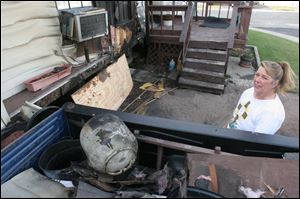
Precaution's the word for deep-frying the bird
11/23/2005
Jeannie Herrick helps clean up damage from a fire caused by a turkey fryer Nov. 12 at her mother's house in East Toledo.
Let's talk turkey.
If you're planning to use one of those popular fryers to cook your Thanksgiving Day fowl, there's a few important things to keep in mind.
Thaw the turkey first, give it plenty of space in the fryer, keep the cooker away from structures, and don't leave it unattended. Otherwise, you could have flames gobbling up your home and some uninvited guests for dinner - the fire department.
That was the case recently for Jean Kenney of East Toledo. She hadn't even put her thawed turkey into the fryer when a fire Nov. 12 spread from the cooker to her mobile home, causing about $8,600 damage.
The 74-year-old said the fryer was in a driveway, several feet from her home, awaiting a turkey for an early Thanksgiving feast with visiting relatives. Her grandson checked the oil and went inside to sit down. She said he looked back outside seconds later and yelled "Fire!"
"I don't know what more we could have done. It wasn't negligent. It wasn't left unattended," said Ms. Kenney, who now is staying with her daughter, Jeannie Herrick.. "We were paying attention to the thing."
But fire and safety officials say many people don't.
The U.S. Consumer Product Safety Commission has reports of at least 120 incidents - fires, flames, or burns - nationwide associated with turkey fryers from 1998 through Nov. 10, spokesman Mark Ross said.
Many incidents occurred be-fore the turkey was in the fryer, when the oil was being heated. Some people were burned with splashing oil, especially when adding frozen meat.
Mr. Ross said turkey fryers are not approved by Underwriters Laboratories because they are considered unsafe. He said the commission is working with the Canadian Standards Association on a temperature- limiting device that automatically shuts off the burner if the oil gets too hot.
Toledo Fire Lt. Richard Bosak said firefighters respond to a couple of turkey fryer fires each year, most between now and New Year's Day.
Three years ago, a Fremont family was left homeless on Thanksgiving when a turkey fryer full of hot oil ignited a garage and spread to their house.
A month earlier, overheated oil in a turkey deep-fryer burst into flames at J.F. Walleyes restaurant and bar, destroying the eatery on Middle Bass Island.
Lieutenant Bosak recommends placing fryers at least 10 feet from structures and to do a displacement test by placing the turkey in the fryer and covering it with water by about a half-inch first to see how much liquid the turkey displaces. Mark a line on the fryer at the water level. Then remove the water, dry out the fryer, and put in the oil - leaving a few inches of space from the top of the fryer.
Ms. Kenney said she didn't have any previous problems with her fryer, which she bought four or five years ago. Despite the melted siding and other damage at her mobile home from the blaze, she doesn't think fryers are dangerous and said she will buy another.
Local and state fire officials offer these additional safety tips when using a fryer:
●Clean off any old grease before use, especially on the outside.
●Use the fryer outside and not in a garage, carport, or covered porch. Place it on a level and nonwooden surface.
●Center the pot over the burner on the cooker, keeping at least two feet of space between the propane tank and the fryer burner.
●Use pot holders when moving the lid or touching the handles and keep bare skin clear.
●Keep close watch on the fryer temperature at all times. If you see smoke, immediately turn it off.
●Lower the turkey slowly into the fryer.
●Keep a fire extinguisher nearby. Don't use water to put out a grease fire.
Contact Christina Hall at
chall@theblade.com
or 419-724-6007.